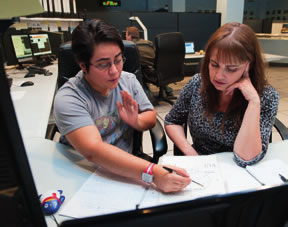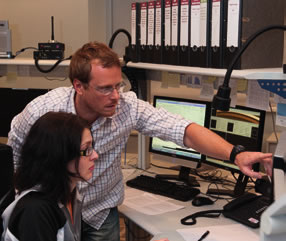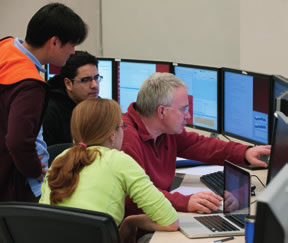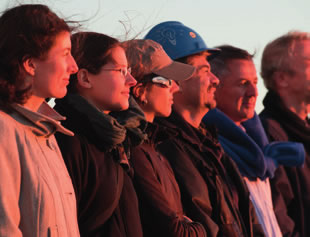Share
Working at ESO
Are you interested in working in areas of frontline technology and in a stimulating international environment? Do you feel your profile matches our requirements? Learn more about our current vacancies and apply online. Read more..








The European Organisation for Astronomical Research in the Southern Hemisphere (ESO) is the foremost intergovernmental astronomy organisation in Europe and the world's most productive ground-based astronomical observatory. ESO carries out an ambitious programme focused on the design, construction and operation of powerful ground-based observing facilities enabling astronomers to make important scientific discoveries.
ESO operates three unique world-class observing sites in northern Chile: La Silla, Paranal and Chajnantor (home to ALMA and APEX), and the ESO Headquarters are located in Garching, near Munich, Germany.
At Paranal, ESO operates the Very Large Telescope, the world's most advanced visible-light astronomical observatory, and will host and operate the southern array of the Cherenkov Telescope Array, the world's largest and most sensitive high energy gamma-ray observatory. ESO is a major partner in ALMA, the largest astronomical project in existence. And on Cerro Armazones, ESO is building the 39-metre Extremely Large Telescope (ELT), which will become "the world's biggest eye on the sky" and whose operations will be fully integrated into the Paranal Observatory.
For its Pipeline Systems group in the Science Operations Software department, based at the ESO Headquarters in Garching, ESO is looking for a
Software Engineer - Science Operations Software
Garching
Deadline 13/10/2024
to work on development and maintenance of the ALMA TelCal software.
The ALMA Telescope Calibration (TelCal) is the online calibration software for the ALMA array of antennas. It combines all the required functionality to optimally tune the ALMA interferometer for successfully executing observations. It provides diagnostic analyses, which are used to assess the observing conditions, monitor the system during observations, and carry out the first level of quality assurance. The TelCal software is written mostly in C++, but also contains components in Fortran and Java. The software is running in a distributed computing environment to serve concurrent observations. Additionally, it provides an offline analysis suite with a Python interface.
The ALMA telescope will undergo the Wide Sensitivity Upgrade (WSU), a major endeavour to improve many components and significantly increase the observation data rates. In this context, your main responsibility will be to contribute to the development and maintenance of the major upgrades required for the TelCal software as part of a small team of developers and in close collaboration with the TelCal subsystem lead. You will also frequently interact with the TelCal subsystem scientists in North America, Europe, and Japan, as well as with the integration, verification, and commissioning team in Chile.
Main Duties & Responsibilities
- Adapt the TelCal software and testing environments to the requirements of the ALMA Wide Sensitivity Upgrade in terms of data model compatibility, algorithm performance, and scalability.
- Debug operational issues in the highly distributed, interconnected, and parallelized ALMA online software environment.
- Implement tools to help navigate, visualize, and diagnose the calibration data to assist support, debugging, and commissioning activities.
- Interact with the subsystem scientists for the specification and validation of the assigned software tools. This task involves translating scientific requirements into software requirements, learning the scientists' language, and reverse-engineering existing algorithms to clarify existing requirements implicit in the software.
- Collaborate with our partners at the ALMA Observatory in Chile and the ALMA Regional Centres to integrate and deploy the software tools and monitor their performance.
- Be prepared for short ('2 week) missions to the observatory in Chile or to ALMA partner sites, typically once or twice a year.
- Participate in the general development activities in the ALMA Computing and Pipeline Systems group.
Key Competences and Experience
- Experience in astronomy and/or interferometry, and knowledge of scientific data processing is expected. Knowledge of radio astronomy telescope calibration would be an asset.
- Experience in programming in C++ and Python as part of large software projects.
- Familiarity and solid experience with modern software engineering practices and tools, including configuration control tools, incremental & iterative development, unit and integration testing and the Linux environment.
- Experience in developing High-performance computing (HPC) applications using both sequential code optimization as well as multi-threaded parallelization and distributed computing.
- Some experience with Java and Fortran programming can be beneficial, as well as understanding of CORBA architecture and DDS (Data Distribution System).
- Experience working in an international multicultural and diverse environment.
- Demonstrated capability of contributing to large software projects throughout the entire software lifecycle up to successful deployment.
- Capability to adjust quickly to changing circumstances and being prepared to work on an already very advanced development.
- Very good oral and written communication skills, to be applied in an international, English-speaking multi-site environment.
- Hands-on, team-oriented approach with a strong focus on operational results and support.
- Willingness to actively contribute to continuous process improvements.
Qualifications:
University degree in Computer Science, Astronomy, Physics, Engineering, or equivalent.
Language Skills:
A very good command of the English language - oral, reading and writing - is essential.
Reports to:
Within the ESO matrix structure, to the Pipeline Systems Group Head (as line manager) and the Head of the ALMA Integrated Computing Team-Europe (as project manager).
Remuneration and Contract:
We offer an attractive remuneration package including a competitive salary, comprehensive pension scheme and medical, educational and other social benefits, as well as financial help in relocating your family and support to place your child/children in daycare.
Our Salary and career structure:
ESO's salary structure is based upon a range of career paths which reflect the nature and level of our roles. Each career path is made up of two or three grades which are used to further reflect experience and performance. The role of Software Engineer - Science Operations Software - is in Career Path V. Please follow this link for more details https://www.eso.org/public/jobs/conditions/intstaff/salary-structure/
ESO aims to support members of personnel in maintaining a good work-life balance (https://www.eso.org/public/jobs/conditions/intstaff/#work-life-balance) between their professional and private life. ESO is also committed to offering family-friendly support (https://www.eso.org/public/jobs/conditions/intstaff/#family-friendly-support), creating a work environment and policies which allow staff to balance their professional and private responsibilities through flexible working arrangements and financial support for families.
The contract is for a fixed term duration of three years, and is subject to successful completion of the probation period. There may be a possibility of extension(s) subject to individual performance and organisational requirements.
For any further information, please visit ESO's conditions of employment (https://www.eso.org/public/jobs/conditions/). Please note that the contract policy and in particular the regulations concerning fixed-term and indefinite contracts are currently under review which may lead to changes in the contractual conditions applicable to this position.
Starting Date:
January 2025
Duty Station:
ESO Headquarters in Garching, near Munich, Germany. This position involves duty travel to the ESO sites in Chile and/or partner institutes in Europe, North America and Japan.
Application:
If you are interested in this position and ready to work in a stimulating international environment, please visit http://www.eso.org or http://almaobservatory.org for further details.
Please apply online at https://jobs.eso.org/. Your application must be completed in English and include a motivation letter and CV.
Closing date for applications is 13 October 2024.
Interviews are expected to start soon after this date.
ESO Values
An important element in any successful employment relationship is harmony in values between an organisation and its people.
The ESO Values are:
ESO strives for excellence through innovation.
ESO provides outstanding services to its communities.
ESO fosters diversity & inclusion.
ESO believes in the key role of sustainability for its future.
Achieving the above are recognized as only possible on the basis of personal values and attitudes that we expect from our employees: respect, integrity, accountability, commitment, collaboration, and clear & open communication.
Applicants to any ESO role are asked to reflect on their affinity with these values and advised they may be asked about them if called for interview.
Diversity
ESO has established diversity as an important value of the Organisation, is committed to providing an equal opportunities environment and is actively seeking to promote a diverse, equitable and inclusive workforce. Please visit https://www.eso.org/public/about-eso/sustainability/dei-at-eso/ for further details.
Nationality
No nationality is in principle excluded from employment at ESO, however, recruitment preference will be given to nationals of our Member States, host states and strategic partners: Australia, Austria, Belgium, the Czech Republic, Denmark, Finland, France, Germany, Ireland, Italy, the Netherlands, Poland, Portugal, Spain, Sweden, Switzerland, the United Kingdom and Chile, irrespective of gender, age, disability, sexual orientation, ethnicity or religion.
